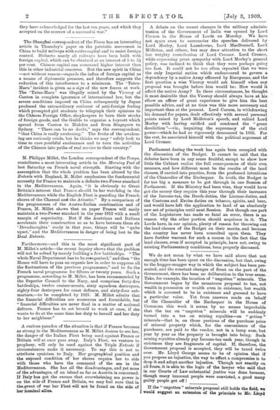The Shanghai correspondent of the Times has an interesting article
in Thursday's paper on the patriotic movement in China to build railways with native capital and to resist foreign control. Hitherto nearly all railways have been built with foreign capital, which can be obtained at an interest of 5 to per cent. Chinese capital can command higher interest than this in other industrial concerns. But the new spirit in China —not without reason—regards the influx of foreign capital as a means of diplomatic pressure, and therefore suggests the reduction of this interference to a minimum. The Tatsu- Maru ' incident is given as a sign of the new forces at work. The Tatau-Maru ' was illegally seized by the Viceroy of Canton in complete ignorance of international law, but the severe conditions imposed on China subsequently by Japan produced the extraordinary outburst of anti-foreign feeling which prompted girl students to telegraph their opinions to the Chinese Foreign Office, shopkeepers to burn their stocks of foreign goods, and the Guilds to organise a boycott which spread from Canton to Mukden and from Singapore to Sydney. "There can be no doubt," says the correspondent, "that China is really awakening." The fruits of the awaken- ing are curiously crude, but he thinks we may "safely look to time to cure youthful exuberance and to turn the activities of the Chinese into paths of real service to their country."














































 Previous page
Previous page